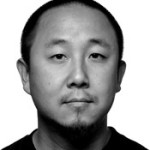Music and poetry in present-day China and Taiwan
How are poetry and music combined? What differences and what similarities are there within and between China and Taiwan in today’s relationships of music and poetry?
Yan Jun (Lanzhou/ Beijing) has become well known since 2003, both for his sound projects and for his poems. Yan Jun wrote about parts of the music scene in China in 2010. His article is collected in the book Culturescapes China (Basel 2010), with other representative texts on recent music and literature.
Some of Yan Jun’s poems are related to political events and concerns. All poetry is political, he once said, which may evoke discussions about art and politics in general, by Adorno and others. On the other hand, Yan Jun has tried to maintain a stance that avoids direct confrontation with the government and negotiates a largely underground breathing space for art and music.
Singers, musicians and poets, artists in general have to organize themselves and work in a way that gets noticed, without going to jail. The ones that do become dissidents and end up imprisoned or in exile are a small minority. Some are more concerned with politics than with art. Others, like Liao Yiwu, have made experiences that have linked their art and their concerns for society in a way that makes it hard for them to continue working, publishing and living in China. Liao Yiwu is a famous example. His approaches to poetry and music are inextricably linked to his experiences at the bottom of society in China. Liao Yiwu left China last year and currently lives on a scholarship in Berlin. He visited Taiwan in January and February 2012. I was fortunate to witness two of his performances in Taipei and Tainan. It was exciting to witness how fast people in Taiwan were able to connect with Liao Yiwu. In Tainan, the reading was at a university, introduced by professors teaching Taiwanese and Hakka, not Mandarin Chinese. The dynamics of music, history, language and poetry were very remarkable.
At the end of Liao Yiwu’s reading in Taipei, he asked Lo Sirong to sing a traditional song in Hakka, a lullaby sung by a working mother, sung mostly to placate herself, perhaps. Lo Sirong is part of a mostly female network of poets and musicians who collaborate on different projects in Taiwan and beyond. One recent project is Fullmoon (Sleepless in moonlight), a six-edition online poetry-sound magazine organized by Tong Yali. In Spring 2012, I translated seven poems by Wu Yining, a Taiwanese reporter, local activist and poetess. She first came to prominence in 2001, reporting from an uprising in Mexico. Wu Yinning quotes rock songs sung in Taiwanese, among other sources.
Singing in different languages, and the use of different languages in general are well integrated in today’s Taiwanese society. There is a general consensus on the protection of cultural diversity. But although Mandarin is no longer the only official language, social and economic conditions nevertheless serve to favor its use.
Cooperation with singers/ songwriters from Mainland China is increasing; there were many concerts by Mainland singers/ songwriters in Taiwan in February 2012. These artists were introduced in the magazine POTS (Weekly supplement Nr. 699, Feb. 24 – March 4, 2012, p. 14/15)
The famous Taiwanese poetess Hsia Yü (Xia Yu) is also famous for her song lyrics, published under pseudonyms. There is a history of pop, rock and DJ culture in Beijing behind Yan Jun’s sound projects, and there is a history of pop songs from Taiwan and Hong Kong since the end of the 1970s that has influenced Mainland China. People who were young at the beginning of the 1980s remember the pop songs of Teresa Teng (Deng Lijun). After the Cultural Revolution, such songs supplanted the Maoist propaganda – they were subversive because they were not political at all. Hou Dejian, who ran away from Taiwan to Mainland China, became the most important cultural figure in the 1989 Beijing Tian’anmen protests that ended with the June 4th massacre in the city. Other artists also performed on Tian’anmen Square, most notably “Rock Music Godfather” Cui Jian. But Hou Dejian was actually crucial to the outcome of the protests. He galvanized the protests in the last few days, along with Liu Xiaobo, Zhou Duo and Gao Xin. And because of his popularity, because even the soldiers knew his songs, Hou Dejian was able to help negotiating the retreat of thousands of students from the square in the early hours of June 4th.
Poetry and music, in traditional forms, such as opera, and in present projects, show the differences and similarities between more official and more informal settings and occasions. Present-day connections between poetry and music in China and in Taiwan enable informal and spontaneous social connections.





